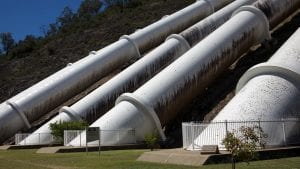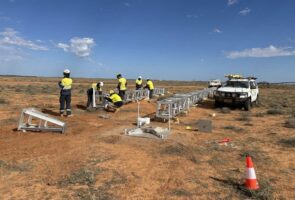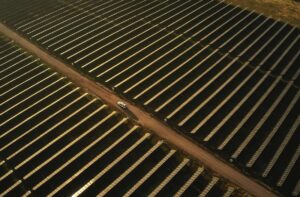 Australia’s deputy prime minister and leader of the National Party, Barnaby Joyce, is headed for a by-election, after the High Court ruled him ineligible to hold his seat due to his dual Australia-New Zealand citizenship.
Australia’s deputy prime minister and leader of the National Party, Barnaby Joyce, is headed for a by-election, after the High Court ruled him ineligible to hold his seat due to his dual Australia-New Zealand citizenship.
The ruling – which has also disqualified fellow “citizenship 7” members, Nationals Deputy Fiona Nash, Greens Senator Scottt Ludlam, Greens Deputy Larissa Waters, and Pauline Hanson’s One Nation party senator, Malcolm Roberts – leaves the Turnbull government without its one seat majority in the House of Representatives. At least until the result of the December by-election.
But what does it mean for the clean energy and climate policy debate in Australia?
For starters, the Court’s decision removes Parliament’s chief flat-earther, in Malcolm Roberts – although he is not the only federal parliamentarian to deny climate change (see Fiona Nash, below).
On energy, Roberts – like Hanson’s One Nation – is broadly anti-renewables and pro-fossil fuels. He notably anointed the Turnbull government’s National Energy Guarantee as both “atrocious”, but also in line with the his party’s desire for the RET to be scrapped and its support of “clean coal.”
In terms of Joyce, the decision temporarily removes one of the fossil fuel lobby’s favourite sons. Last month, he issued a rousing call to arms to Australia’s mining and resources industry, warning that if they lost the fight for new coal-fired power generation to the “fatuous economics” of renewable energy and green groups.
In a speech to the Minerals Week Seminar, the deputy PM painted a picture of a nation under attack from a sort of economy destroying “green peril” that would shut down coal power plants, kill coal exports and – of course – turn the lights out.
“Around about January, ladies and gentlemen, families are going to come back from holiday, mum and dad are going to go back to work, mum’s going to turn on the air conditioner, get the kids ready for school, school’s going to turn on the power, and if we don’t watch out, the lights are going to go out,” Joyce said.
“And this will be a salutary lesson on how economics really work. A salutary lesson against the fatuous economics that’s being peddled.
(“In the) Galilee Basin, we are in the fight of our lives trying to open up a mechanism that will create wealth for this nation. Total insanity!” he said. “What’s one of our biggest exports, or our biggest export? Coal. And what are we making the argument against? That we should use coal. It’s absurd. …I just don’t get it.”
Joyce also doesn’t get climate science, and like his compatriot, Fiona Nash, is skeptical about the research credentials of global warming.
“Look….I just – I’m always skeptical of the idea that the way that anybody’s going to change the climate – and I’m driving in this morning and we’re driving through a frost – is with bureaucrats and taxes,” he told conservative commentator and noted climate denier Andrew Bolt in an interview in 2015.
“All that does is….it’s a self-fulfilling prophecy. I make you feel guilty so I can get your money and put it in my pocket and send reports backwards and forth to one another,” he said.
But Joyce may not be gone for long. The by-election is expected to be held very soon, probably December 2, and Joyce is expected to win, even if popular independent member – and friend of renewables and climate science – for New England, Tony Windsor, decides to run against him. UPDATE: Tony Windsor has announced he will not be running against Joyce.
Good luck @TonyHWindsor pic.twitter.com/OyA7q2WdCz
— Rob Oakeshott (@RobOakeshott1) October 27, 2017
And Joyce’s brief absence should be countered by the safe return of Matt Canavan, the Queensland Nationals Senator who, along with SA independent Nick Xenophon, was cleared by the High Court, despite having dual Italian citizenship. The Court ruled that Canavan did not know about his Italian citizenship, and so could not have taken all reasonable measures to renounce it.
Canavan, who has already been reinstated as the federal minister for resources and northern Australia, was recently dubbed the “minister for the mining sector”, after his heartfelt farewell to the sector when the citizenship scandal first reared its ugly head in July and he stepped aside.
“It has been such an honour to represent the Australian mining sector over the past year,” he wrote on Facebook. “From the small, gambling explorers and prospectors to the large, world-beating multi-nationals, the industry provides rich and diverse experiences that can take you to the smallest towns of outback Australia to the biggest cities in the world.”
The note sparked instant outrage from readers, who noted Canavan was “supposed to represent the people of Queensland, and not private mining companies.” We will see whether his priorities have changed any when he returns to work.
The disqualification of Nationals Senator number three – and deputy leader of that party – NSW Fiona Nash (minister for regional development) could be chalked up as a small win for climate policy. Nash, like Joyce, is skeptical about the science, telling Sky News last year “I don’t think it is certainly necessarily settled.”
To Malcolm Roberts, it is farewell, after just one year in Parliament. During this short period of time, Roberts has distinguished himself by repeatedly denying the human influence on climate change; by introducing a hoax “conceptual penis” research paper to Parliament in an effort to undermine the validity of peer reviewed science; and asked Chief Scientist Alan Finkel if it was important for scientists to have an open mind, to which Finkel responded: “yes, but not so much that your brain leaks out.”
In a statement on Friday afternoon, Roberts said he was sad to leave federal parliament, but accepted the High Court decision entirely. Probably because it’s not based on science. Roberts will now run for the seat of Ipswich – the “heart of One Nation” – in Queensland state politics.
One Nation, meanwhile, still holds four seats in federal parliament. Next in line for Roberts’ seat is Fraser Anning – a publican from the Queensland coal region of Gladstone, who attracted just 19 first preference votes last year. His stance on renewables and climate is not immediately clear – neither his Facebook page nor his One Nation profile were accessible at the time of publication – but he is a fan of a good conspiracy theory.
For the Turnbull government, it is a blow, and an embarrassment, whether the PM likes to admit it or not.
In an upbeat address to reporters on Friday afternoon, Turnbull said the Coalition had remained focused on the business of government pending the Court’s decision, and pointed to his National Energy Guarantee as evidence of that. Never mind that the NEG has been widely derided as non-policy; at best an outline of one possible framework among many.
Turnbull even took the opportunity to do some energy politicking, telling reporters “we all know that Labor’s (energy policy) would see prices rising as far as the eye can see.”
Tony Windsor, who has confirmed he will not be contesting the by-election, said one of the main things that kept him interested in federal politics was the “discgraceful” short-term politics Coalition members like Abbott and Joyce, who supported climate and energy policies that “do nothing” to solve the problems of the future.
And he also noted that, despite Joyce’s position as the front runner for New England, the by-election would open up a key seat to other candidates, who could campaign on some of the key, long0-term political issues that he felt the Turnbull government had fudged.
“The government has a majority of one,” he told the ABC on Friday afternoon. “Now that ‘one’ is going to be out of town for a while. … so if people want to get up there and talk about the significant issues that affect New England, I’ll be right up there supporting them,” Windsor said.









